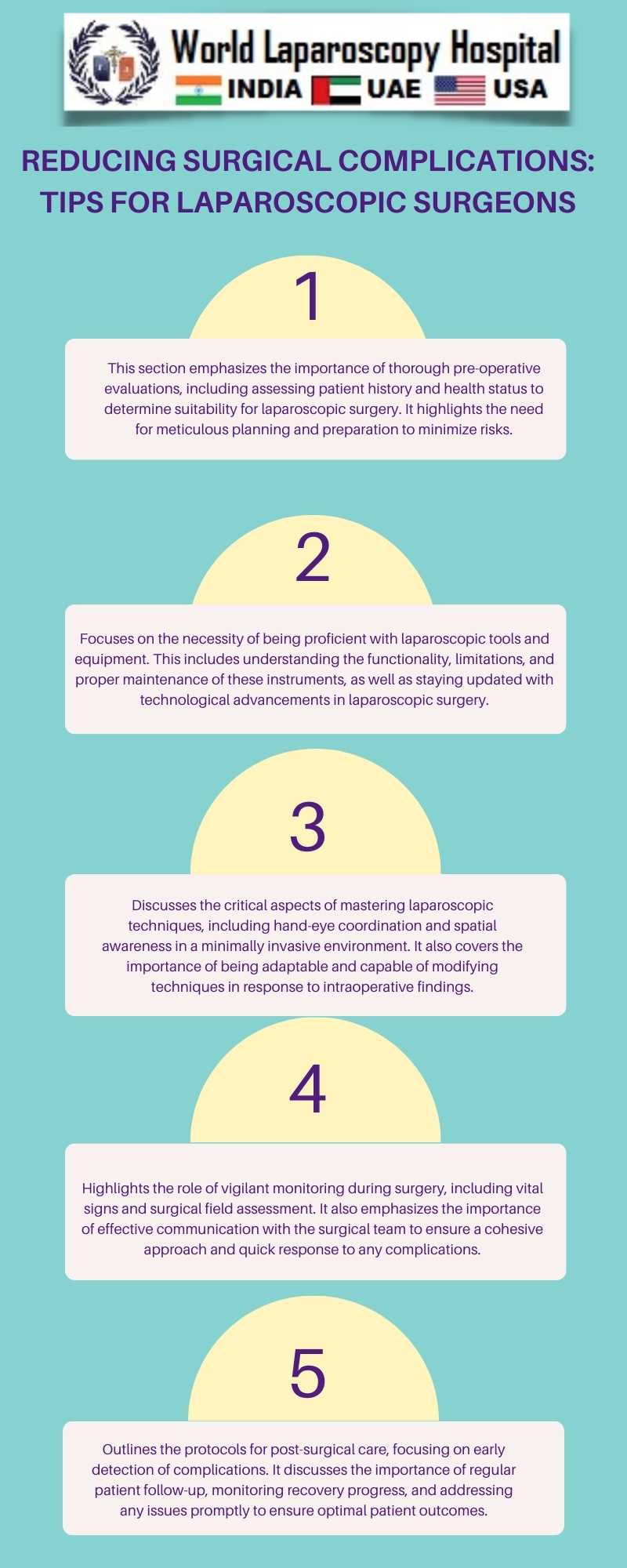Reducing Surgical Complications: Tips for Laparoscopic Surgeons
Introduction
Laparoscopic surgery, also known as minimally invasive surgery, has revolutionized the field of surgery by offering reduced recovery times and minimized incisions. However, like any surgical technique, it carries inherent risks and potential complications. This essay explores strategies and tips for laparoscopic surgeons aimed at reducing surgical complications, ensuring patient safety, and improving surgical outcomes.

1. Comprehensive Preoperative Planning
Effective preoperative planning is crucial in minimizing complications. This includes:
- Detailed Patient Evaluation: Understanding the patient's medical history, including any previous surgeries and existing health conditions, is essential. Special attention should be paid to factors that may increase the risk of complications, such as obesity, diabetes, and cardiovascular diseases.
- Imaging and Diagnostic Tests: Utilizing imaging techniques like ultrasound, CT scans, or MRI can help in understanding the patient's anatomy and planning the surgical approach accordingly.
- Informed Consent: Ensuring that the patient is fully aware of the potential risks and benefits of the procedure.
2. Mastery of Laparoscopic Techniques and Instrumentation
- Skill Development: Continuous training and practice are vital for mastering laparoscopic techniques. Simulators and training workshops can be invaluable for honing skills.
- Understanding and Handling of Instruments: Familiarity with various laparoscopic instruments and their correct usage is critical. This includes understanding the limitations and potential risks associated with each instrument.
3. Adherence to Safety Protocols
- Avoidance of Trocar Injuries: Proper insertion techniques for trocars can significantly reduce the risk of injury to internal organs.
- Maintaining Optimal Visibility: Clear visualization is essential. This involves proper management of the camera and lighting, as well as ensuring a clear operative field.
- Monitoring and Management of Pneumoperitoneum: Careful monitoring of intra-abdominal pressure and gas flow can help prevent complications related to pneumoperitoneum.
4. Effective Team Communication and Coordination
- Clear Communication: Effective communication with the surgical team, including the anesthesiologist, nurses, and other surgeons, is key to a successful laparoscopic procedure.
- Teamwork: A well-coordinated team can efficiently respond to unexpected challenges and reduce operative time, thereby decreasing the risk of complications.
5. Postoperative Care and Follow-up
- Monitoring for Complications: Close monitoring in the postoperative period for signs of complications such as infection, bleeding, or organ injury is essential.
- Patient Education: Educating the patient about the signs of complications and the importance of follow-up visits can aid in early detection and management of postoperative issues.
Conclusion
Reducing surgical complications in laparoscopic surgery requires a multifaceted approach. This encompasses thorough preoperative planning, mastery of surgical techniques, adherence to safety protocols, effective team communication, and diligent postoperative care. By implementing these strategies, laparoscopic surgeons can significantly enhance patient outcomes and push the boundaries of surgical excellence.
Laparoscopic surgery, also known as minimally invasive surgery, has revolutionized the field of surgery by offering reduced recovery times and minimized incisions. However, like any surgical technique, it carries inherent risks and potential complications. This essay explores strategies and tips for laparoscopic surgeons aimed at reducing surgical complications, ensuring patient safety, and improving surgical outcomes.

1. Comprehensive Preoperative Planning
Effective preoperative planning is crucial in minimizing complications. This includes:
- Detailed Patient Evaluation: Understanding the patient's medical history, including any previous surgeries and existing health conditions, is essential. Special attention should be paid to factors that may increase the risk of complications, such as obesity, diabetes, and cardiovascular diseases.
- Imaging and Diagnostic Tests: Utilizing imaging techniques like ultrasound, CT scans, or MRI can help in understanding the patient's anatomy and planning the surgical approach accordingly.
- Informed Consent: Ensuring that the patient is fully aware of the potential risks and benefits of the procedure.
2. Mastery of Laparoscopic Techniques and Instrumentation
- Skill Development: Continuous training and practice are vital for mastering laparoscopic techniques. Simulators and training workshops can be invaluable for honing skills.
- Understanding and Handling of Instruments: Familiarity with various laparoscopic instruments and their correct usage is critical. This includes understanding the limitations and potential risks associated with each instrument.
3. Adherence to Safety Protocols
- Avoidance of Trocar Injuries: Proper insertion techniques for trocars can significantly reduce the risk of injury to internal organs.
- Maintaining Optimal Visibility: Clear visualization is essential. This involves proper management of the camera and lighting, as well as ensuring a clear operative field.
- Monitoring and Management of Pneumoperitoneum: Careful monitoring of intra-abdominal pressure and gas flow can help prevent complications related to pneumoperitoneum.
4. Effective Team Communication and Coordination
- Clear Communication: Effective communication with the surgical team, including the anesthesiologist, nurses, and other surgeons, is key to a successful laparoscopic procedure.
- Teamwork: A well-coordinated team can efficiently respond to unexpected challenges and reduce operative time, thereby decreasing the risk of complications.
5. Postoperative Care and Follow-up
- Monitoring for Complications: Close monitoring in the postoperative period for signs of complications such as infection, bleeding, or organ injury is essential.
- Patient Education: Educating the patient about the signs of complications and the importance of follow-up visits can aid in early detection and management of postoperative issues.
Conclusion
Reducing surgical complications in laparoscopic surgery requires a multifaceted approach. This encompasses thorough preoperative planning, mastery of surgical techniques, adherence to safety protocols, effective team communication, and diligent postoperative care. By implementing these strategies, laparoscopic surgeons can significantly enhance patient outcomes and push the boundaries of surgical excellence.
2 COMMENTS
Dr. Shanaya
#1
Jan 18th, 2024 8:33 am
Mitigating complications in laparoscopic surgery demands a comprehensive approach: preoperative planning, surgical mastery, safety adherence, team communication, and diligent postoperative care. Implementing these strategies empowers laparoscopic surgeons to elevate patient outcomes and redefine surgical excellence.
Dr. Shweta Bhintade
#2
Jan 27th, 2024 11:14 am
Reducing laparoscopic surgery complications demands a comprehensive approach, including preoperative planning, surgical technique mastery, safety protocol adherence, team communication, and postoperative care. Implementing these strategies enhances patient outcomes and advances surgical excellence.
| Older Post | Home | Newer Post |


